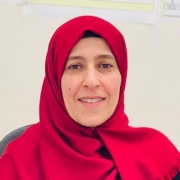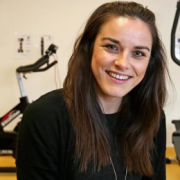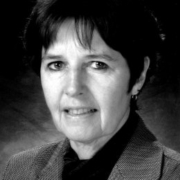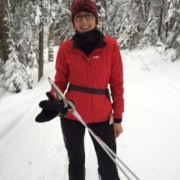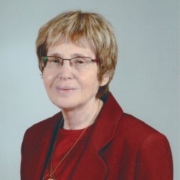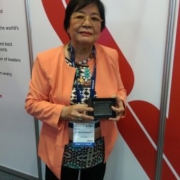- What is your role at your work?
I am Head of the Cardiovascular and Renal research group in the Department of Physiology at Monash University. I lead the work of a team of post-doctoral scientists and PhD students in a range of projects. I also make a significant contribution to undergraduate teaching, being the academic Convenor of a third years unit with an enrolment of >350 students a year.
- How did you get interested in your career path?
During my undergraduate degree, cardiovascular and renal physiology were the areas that I found most interesting and therefore did best in. In research it is very important that you find the area that you work in stimulating if you are to maintain your interest – the kidney is fascinating!
- What are you most proud of in your career or otherwise?
I am most proud of my two children, and then my contribution to research and the training of new scientists.
- What important career challenges have you faced and how did you overcome them?
Obtaining funding is the most challenging aspect of research, without it you cannot continue. You need to understand what it is that makes a funding application successful and to make sure you are meeting all the benchmarks in what is a highly competitive environment.
You also need to recognise opportunities when they arise. An unexpected finding can take your work in a new direction and lead to important discoveries. A negative finding can be very important if interpreted in the correct light.
- What advice would you give your younger self?
You should plan ahead for career interruptions due to childbirth to protect your track record and to give yourself maximum time for recovery due to loss of productivity.
You should gain an understanding of what is important in terms of building your reputation (track record) as a scientist. A lack of understanding can lead to you not receiving due recognition for your work. For example, you should discuss author order at the beginning of a study, not at the end.
Your need to ensure that your partner/ husband understands and recognises how important your work is to you. If they are not supportive of the time and effort required to be successful in research, this will be a significant obstacle.
- Highlight your most significant research contributions and publications (3-5) – if relevant to you.
Denton KM, Fennessy PA, Alcorn D, Anderson WP. Morphometric analysis of the actions of AngII on renal arterioles and glomeruli. Am J Physiol 262:F367-72, 1992. 71 citations
At the time of this study the site of action of angiotensin II within the renal vasculature was hotly debated, with cases being made for a predominant action of angiotensin II at both pre and post glomerular vessels. Our study investigated the role of angiotensin II in the control of pre- and post-glomerular vascular tone via scanning electron microscopy of vascular casts. The findings lead to the establishment of the important concept of how the efferent arteriole plays the key haemodynamic role in affecting glomerular capillary pressure, despite its smaller diameter changes and added considerable evidence to the debate supporting the predominant actions of angiotensin II on the efferent arteriole.
Denton KM, Shweta A, Anderson WP: Pre- and post-glomerular resistance responses to different levels of sympathetic activation by hypoxia. J Am Soc Nephrol 13:27-34, 2002. 50 Citations
Overactivity of the renal nerves has been implicated in conditions such as high blood pressure, congestive heart failure and chronic renal failure. It is therefore very important to understand how the renal nerves control kidney function. We proposed that there are distinct populations of nerves that influence selectively the different tasks that the kidney performs, not a single population affecting kidney function globally as has been the consensus for the last 30 years. In this technically demanding study we demonstrated that a moderate reflex increase in renal sympathetic nerve activity (RSNA) increased glomerular capillary pressure, while a greater increase in RSNA decreased glomerular capillary pressure. Results compatible with our hypothesis that the nerves innervating the renal arterioles could be selectively activated allowing differential control of glomerular capillary pressure and hence glomerular ultrafiltration.
Sampson AK, Moritz KM, Jones EM, Flower RL, Widdop RE Denton KM. Enhanced angiotensin II type 2 receptor mechanisms mediate decreases in arterial pressure attributable to chronic low-dose angiotensin II in female rats. Hypertens. 52:666-71, 2008. 87 citations
Remarkably, we demonstrated that a chronic low dose infusion of AngII (50ng/kg/min AngII s.c.) decreased BP in female rats (~10mmHg) at a dose that caused BP to increase in males (~5 mmHg). These startling findings illustrated the dual nature of AngII on BP and are consistent with the opposing vascular effects of angiotensin type 1 receptor (AT1R) and AT2R activation. This finding is potentially of great significance as it suggests that females have in place a mechanism to counter the classic pressor effects of AngII that is not operative in males. This provides evidence that drugs that block the RAS, a mainstay in the treatment of cardiovascular disease, may behave differently in men and women and this may help to explain sex-differences in response to therapy. Understanding the protective factors that exist in females could be used to lower morbidity and mortality in males at all ages, and maintain protection in elderly women.
Lankadeva YR, Singh RR, Moritz KM, Parkington HC, Denton KM*, Tare M*: Renal Dysfunction is Associated with a Reduced Contribution of Nitric Oxide and Enhanced Vasoconstriction Following a Congenital Renal Mass Reduction in Sheep. Circulation 131:280-8, 2015.
A study that took more than 5 years to complete, commencing whilst the sheep were in utero and following them until 5 years of age. Using a combination of in vivo studies in conscious sheep and in vitro functional and molecular studies in isolated arteries, the mechanisms responsible for impairments in renal function in sheep born with a solitary functioning kidney, at an advanced age. We showed that renal dysfunction was associated with impaired modulation of renal hemodynamics and sodium excretion by nitric oxide. Furthermore, marked vascular dysfunction, predominantly in the renal vasculature, was observed in uni-x sheep that was underpinned by endothelial vasodilator dysfunction involving nitric oxide and prostanoid deficiencies, enhanced oxidative stress, and augmented smooth muscle responsiveness to vasoconstrictors and sympathetic nerve stimulation. Identification of these pivotal mechanisms may have potential implications for improving the prognosis and treatment of children born with a solitary functioning kidney.
- Have you had any significant career mentors? If yes, please provide further details.
Professor Paul Korner and Professor Warwick Anderson.
Paul Korner was the Director of the Baker Medical Research Institute, when I undertook my post-graduatetraining. He taught me a surgical model of hypertension, which I have used throughout my studies. He was an awe-inspiring scientist and one strived to obtain his recognition.
Professor Warwick Anderson was my primary mentor throughout my early career. He was everything that a young scientist could wish for, supportive in that he was always available for discussions, optimistic in his outlook as he always saw the positive aspects of my work when I couldn’t and willing to let you follow new ideas. I enjoyed the early years of my research career primarily due to the friendly, creative environment established within Professor Anderson’s group.
I think I was fortunate in my mentors in that they fostered my passion for research, and as such I have stayed and worked in research for my whole career.
- How can we support the next generation of women scientists?
I think that women on paper often look as good as men in term of their research profile. I think that it is often under-recognised that women achieve this parity whilst having significant carer responsibilities. However, women are generally slow to recognise their own worth and slow to seek promotion; waiting until they exceed all expectations for the next level before applying. Women at all stages of their career should be actively encouraged and supported to apply for promotion.





























